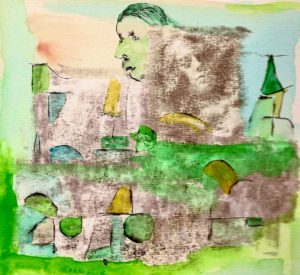Forget it
People often complain about their poor memory. They might tell you “I wish my memory were better. Maybe there is something wrong with me and that is why I forget all sorts of things.”
I remind people that it would be even more helpful, even liberating, to be able to erase disruptive, destructive memories of past experiences.
Before I became the Director of the National Forgetting Clinic (NFC) I was a scientist studying the biological basis of memory. In the course of my research I was fortunate enough to work with neuroscientists studying all sorts of brain functions. Years ago, while talking to one of my colleagues, Bob P, I suggested doing a simple experiment with him as a subject. I would get him to imagine an amusing scene. “Bob, close your eyes and now imagine a prestidigitator sitting on an elephant tossing colored billiard balls into the air and then catching them. Got it. ” Bob smiled. “Cute image. ” I then added, “Bob you will never, never forget that image, which is now in your memory. During the next 15 years on about half a dozen occasions when I saw Bob in the hallway or in the cafeteria I would ask Bob, “What that I tell you that I said you will always remember as long as you live.” Bob laughed …you mean the prestidigitator sitting on an elephant tossing colored billiard balls in the air.” I responded “Right down to the very details that I said you would never forget.
One day we had a serious conversation that centered on what we could do to rid him of this memory, all of it. We found that a challenge and never came up with a viable solution. We agreed that getting rid of that image in his memory was not possible short of cutting out much of his brain.
Later we went our separate ways but the problem of how to erase an experience in memory stayed with me. While working on this problem I came up with several potential solutions which prompted me to establish the National Forgetting Clinic (NFC) with branches in 17 cities around the world. The goal was to provide support for individuals struggling with memories of experiences that were disrupting their lives. Below are some examples of memories that individuals want to discard but couldn’t do so. They were stuck, imprisoned by the past experiences in memory. We helped them free themselves from crippling memories.
What makes the NFC unique is not just the effort to help individuals forget but also to help them reclaim a life unburdened by harmful recollections. Despite the scientific breakthroughs in neurobiology the ability to selectively erase a memory without causing irreversible harm remains an elusive goal. Yet, this is where the NFC provides hope research and application into memory manipulation, using techniques like targeted neurostimulation and controlled memory reconsolidation. We at the NFC focus on helping people cope, adjust, and manage their memories, using innovative therapies and support systems.
She almost died
Near death experiences are rather common. My young and pretty neighbor nearly died when a car slammed into the driver’s side of her car. She could still hear the sound of the crash, the screeching tires and the moment of impact, the shattered glass raining on her as she lay there behind the wheel gasping for breath, shaking, crying. The memory of that auto accident remains visited, easily remembered and paralyzing. Paralyzing. It has been over a year since she was on the beltway where the accident happened. There are weeks at a time when she is unable to get behind the wheel of her replacement car. Anxiety marks the spot wherever she drives. She never drives when her kids are in the car. If only she could strip the angst from her memory of that event. How is it possible to do that? How is it possible to return to a life that is fun, engaging? How can she resume her close rich relationships with friends, family, coworkers. How can she avoid being startled by the sound of brakes suddenly applied. Then there are the nightmares in which she lies dying slumped over the steering wheel of the car she was driving.
My friend Lothar remembers growing up poor (truncated)
Lothar still has an accent. It is hard to get rid of an accent when you learn a new language as an adult. It may be even harder to get rid of life style experiences, habits, learned as a child.
Aside from his accent Lothar is obviously different from the people around him, based on how he dresses, his social mannerisms, and the car he drives, sometimes recklessly. He is a very smart, wealthy mathematician who lives like someone struggling while on welfare.
I asked Lothar several times why he drives around in an old rusty Ford Fiesta that features numerous patches of duct tape to keep fenders from falling off. “Why do you drive around in a death trap? ” to which he always gives me the same answer “I have my reasons. ” I respond, “Reasons, reasons? What does that mean? I laugh when he repeats, “I have my reasons. ” Other bits and pieces to his lifestyle include buying his clothes second hand at a Goodwill store, buying not one but 4 boxes of cornflakes when they are on sale.
Lothar is wealthy, spends nothing on himself but is amazingly generous when it comes to others. I tell him “I don’t get it. Why do you deprive yourself of even simple things that most of us take for granted and you always give me the same answer “I have my reasons.”
And I give him the same response “Reasons? …but Lothar
That is bullshit… you have your reasons which are not an answer and you know it.”
At that moment I suggested to Lothar that we have a beer together and he can give me another lesson in the theory of numbers. I wasn’t surprised when Lothar declined but instead suggested we have some tea and a Danish and I agreed. Like making him happy which isn’t very hard. He seemed to be more relaxed than usual and maybe that is why for the first time he told me why he drove his duct tape and his used clothes dress code. I was touched and amazed by what he told me.
He spoke slowly about life as Lothar as a child. “We had a saying that when eating a piece of toast, you could either put some jam on it or some butter but never both. My parents bought my brother and I clothes from a push cart. I never knew what an ice cream Sunday tasted like until I was about 8 and even then, it was a neighbor that paid for it. I can go on and on but I learned something about what it was like to live poor and frugal. The experience stuck and here I am unable to leave behind a way of life once lived that needn’t be now.
I found the story he told sad and one that moved me to think about what drives who we are once we are grown and can make our own decisions. “You know Lothar, maybe many of us are stuck in the past like you. Maybe those early experiences are so well etched in our being that, as adults, they get played out automatically. A childhood world becomes our world now and we aren’t even aware of it. No eraser that I know can delete what I knew was the real world and no longer relevant.
Lothar nodded, “You know I think you are right and I have always known that to be true. I guess experiences in our memory can never be erased even if we think that they are forgotten.”
I got Lothar to go to the NFC since they might have ways to help you get past your childhood experiences of poverty. One of the staff of the NFC suggested
“Why don’t you invent someone, a character of your own casting, someone who can enjoy a car that is safe and some clothes that make you into a good-looking guy with some bravado to top off your chosen role and costume.
Lothar laughed out loud. Why not give it a go. It might work and might be fun.
The shoe thief
It happened many decades ago. Sandor has tried but couldn’t forget what he did. It is a memory of what happened in Labor Camp Larger 17 B. The Lager was near a stone quarry in Austria near the German border. It was an area that was heavily wooded 25 km from the nearest town. There were a total of 21 Lagers in the camp. Once arriving in the camp, the average life expectancy for the worker prisoners was 5 weeks.
The war was almost over but not yet for the prisoners huddled in the freezing elongated wood shack that was home to over a hundred prisoners. Each prisoner was alone in their efforts to survive another day. Those prisoners who did not survive were replaced by others not yet familiar with the schedule of exhausting work, hunger, cold and the struggle even to find a place to try and sleep on the beds of wood boards. Everything matters to survive to spend another day working before falling dead in the quarry.
Being without shoes is a death sentence. You can’t survive in the quarry without shoes.
One of the prisoners in larger 17 B made a fatal error, going to the latrine without taking his shoes with him. Sandor saw them standing there at attention. He took them and hid them. He hadn’t planned. He grabbed the shoes on impulse but maybe with some planning …who knows. Part of him regretted doing that but it was too late. The shoes were now his. Shoes are a precious commodity that can be traded for a bit more food or an extra blanket.
When the man came back from the latrine and his shoes were missing he started to scream in agony, pain, anger hoping that someone would reveal where his shoes were and perhaps who might have taken them.
No one spoke up. The man’s hopelessness and helplessness left him exhausted. Prisoners were worthless workers without shoes and so the next morning, he was led away to his death.
It haunted Sandor for the rest of his life. He never married, had few friends and was very private. The mailman knew more best. Even the people he worked with as a tool and die maker or neighbors knew little about him. Few things gave him much pleasure with the exception of nature. He often would hike especially in forested areas or near mountains but never by the ocean. When he was much older his sense of guilt morphed into a paralyzing depression. As a last resort Sandor came to the NFC for help. He died, a probable suicide before he could be helped to treat his fatal memory of what he had done to cause the death of a fellow prisoner.
Comment
All of us have memories of experiences that are indestructible….they live forever. We are familiar with this common phenomenon which makes it no less remarkable. Those memories are as much a part of who we are as inherited genetic information. The search continues to understand the mechanisms that are responsible for forming and maintaining memories that play a huge role in defining who we are.

